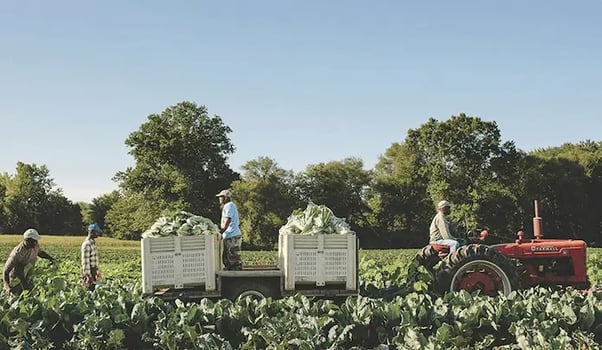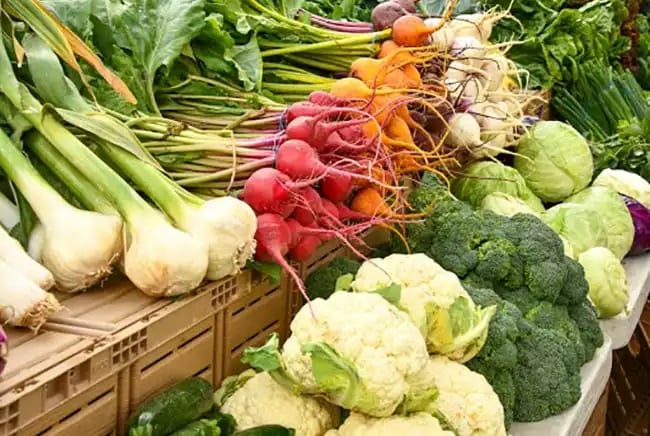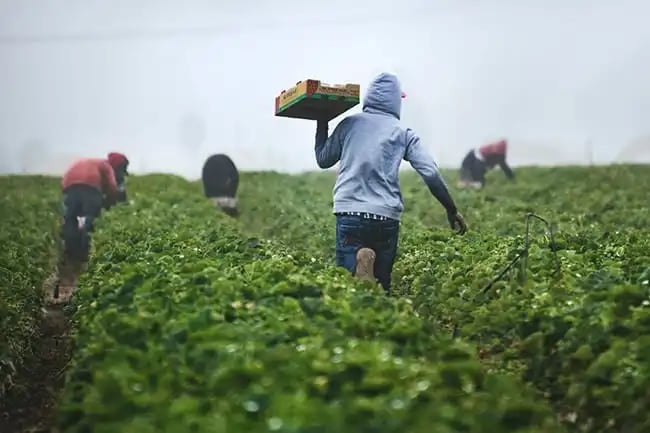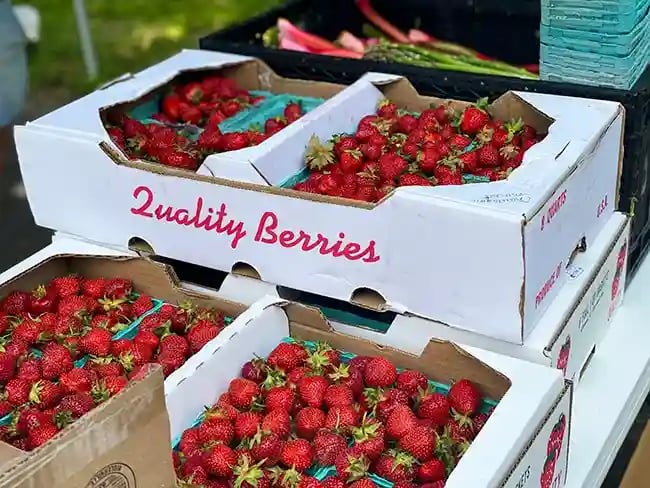The Bypass Project: creating farm-to-consumer direct supply chain
Reos Partners
July, 2021

Category
Topics
Find out how the Bypass Project is enhancing food security and resiliency in two of Connecticut’s most significant food deserts.
It is estimated that 42 million people in the United States may experience food insecurity in 2021. While the pandemic played a significant role in this, for a variety of other reasons, people in underserved communities often lack reliable, affordable access to fresh, locally grown foods. At the same time, local farmers are distanced from the people who benefit from the food they produce.
Meet Red Tomato. This mission-driven nonprofit organization is dedicated to working with local growers and communities across the Northeastern United States to improve the long-term viability of small and mid-sized farms. Recently, the organization realized a missing link in serving its mission: While Red Tomato helped growers distribute and sell their product to retailers, underserved communities in the area were being left out, with little to no options to obtain fresh, local produce. Thus began the Bypass Project.
The leadership team at Red Tomato contacted Reos Partners to assist with the Bypass Project, which is focused on doing just that—bypassing retailers and distributing food directly from growers to the underserved communities who need it. The pilot project is currently underway in inner-city communities in Connecticut, with the hope that a successful pilot will serve as a model that can be adapted across not just the Northeast, but the entire country.
We connected with Reos Partners Senior Associate Jacqueline McLemore, Red Tomato Founder Michael Rozyne, and Red Tomato Executive Director Angel Mendez to learn more about the work being done to provide affordable and equitable food access to underserved communities in the Northeast.
 Jacqueline McLemore is a Senior Associate at Reos Partners. She is deeply committed to supporting diverse groups of people as they develop and collaborate on tough—and tender—issues. Driven by an innate curiosity and her Mississippi roots, Jacquie’s passion for social justice and civil rights remain core to her life’s work. She has spent more than 25 years teaching teamwork, group facilitation skills, human behavior, coaching skills, and organizational development methodologies.
Jacqueline McLemore is a Senior Associate at Reos Partners. She is deeply committed to supporting diverse groups of people as they develop and collaborate on tough—and tender—issues. Driven by an innate curiosity and her Mississippi roots, Jacquie’s passion for social justice and civil rights remain core to her life’s work. She has spent more than 25 years teaching teamwork, group facilitation skills, human behavior, coaching skills, and organizational development methodologies.
 Michael Rozyne founded Red Tomato in 1997. He has been a marketer of small farm products and trailblazer in the Good Food Movement for more than three decades. He worked on conventional and organic farms in Maine, and was Purchaser and Marketer for a regional food distributor in New England. Michael was a co-founder of the fair trade coffee company Equal Exchange.
Michael Rozyne founded Red Tomato in 1997. He has been a marketer of small farm products and trailblazer in the Good Food Movement for more than three decades. He worked on conventional and organic farms in Maine, and was Purchaser and Marketer for a regional food distributor in New England. Michael was a co-founder of the fair trade coffee company Equal Exchange.
 Angel Mendez is the Executive Director at Red Tomato and has been with the company for 20 years. He is a longtime food systems innovator and an integral part of the food community in the Northeast and nationally. He serves as a National Good Food mentor, Treasurer on the board of the Urban Farming Institute, and board member for the Equal Exchange banana company.
Angel Mendez is the Executive Director at Red Tomato and has been with the company for 20 years. He is a longtime food systems innovator and an integral part of the food community in the Northeast and nationally. He serves as a National Good Food mentor, Treasurer on the board of the Urban Farming Institute, and board member for the Equal Exchange banana company.
What is the mission of Red Tomato?
Angel: We operate as food system change agents. One of the biggest things growers need for farm viability is market access. We run multiple projects around supply chains—one around bringing affordable and equitable food access into underserved communities. We also work to help consumers understand their full range of sustainable food choices, and what farming really entails. We fight to level the playing field so that we can continue to support the mission of differentiating our local grower’s produce by sharing their good practices through point of sale and through our programmatic work.
Michael: People often see business and mission-driven as separate sectors, and that separation can get both sides into trouble. The business side is disconnected, thinking its only purpose is to make money for shareholders; and the mission-driven side can be disconnected from the practical side of operations. Our hybrid model at Red Tomato fuses them together, trying to do business in a way that accomplishes both business goals for farmers and excellent products for consumers, while following a cause-related mindset and putting all of our decisions through those filters.

Photo by Shelley Pauls on Unsplash
What is the Red Tomato Bypass Project that Reos Partners is helping to facilitate?
Jacquie: The idea of Red Tomato is figuring out how to bring people who actually grow the food together with people who eat the food. Simple, right? You would think so, but all these systems get in the way of that direct connection. The idea of the Bypass Project is determining how to bypass those systems that create confusion and noise and create impediments to each side getting their needs met.
People who are eating the food want access. They don't want it to be complicated. They don't want it to be pricey. But access is about more than price. Access means availability of quality product, and that includes where stores and programs are located, and what they offer. Meanwhile, the folks who are growing this food are interested in getting a solid product to people who will appreciate it.
Angel: The Bypass Project is focused on bringing parts of the community together that generally don't talk—the growers and participants in underserved communities. We saw the need to bring these two groups together in order to build a supply chain that bypasses the retailer. The retailer part of it is getting harder for local mid-size farms. They are expected to match the price that the largest commodity farms sell for, even if those farms are a thousand miles away. We want to connect the two parties and build synergies. Figuring out a path forward means understanding how to build a supply chain that could build efficiencies and reduce costs to create a steady flow of food into these communities.
Can you elaborate on the systems that get in the way and how they impact underserved communities?
Jacquie: We're talking about transport, logistics, all of the things that add cost to the product. There are often multiple steps between the grower and the consumer. Larger national grocery stores may also put all kinds of constraints on the grower. All of these kinds of things get in the way, adding cost and impacting the quality of the product.
Angel: I grew up in the inner city so I've seen and been part of the disparities. I know what it's like to be in those communities. I understand the problem of how food could be less accessible. It's a big deal now for me to bring back all of that knowledge. I'm at Red Tomato to bridge the small farming community with the underserved communities and bring that synergy so that we can build this food supply chain program that we all want to see.

Photo by Tim Mossholder on Unsplash
How did Red Tomato come to work with Reos Partners?
Michael: Early in my career I worked in the food cooperative sector and then helped establish Equal Exchange as a worker-owned cooperative. I was trained and taught that good process had to do with everybody participating almost equally. That can be great, but sometimes there is so much emphasis on democratic process that there is an imbalance between process and action. I felt it held back the kind of impact and results we could get.
Later on I became acquainted with [Reos Partners Director] Adam Kahane’s book Collaborating With the Enemy. It spoke to me and some of the contradictions I saw in my own training and experience, so I quickly became a disciple of that approach to action learning. I found a soulmate in Angel Mendez because I felt like it was sometimes hard for me to explain this approach, but Angel understood. We felt like this was the right approach to this new project that we are unearthing together.
Angel: I've been in a lot of collaborations where people come to the table with lots of heart and they feel like, yeah, we're going to change the world. But then when you start to really talk about the things that we need to collaborate on, reality sets in and that collaboration breaks apart. At Red Tomato, we want to make the most out of the capacity we put forward. For this project, we knew we would need somebody to help move the collaboration forward so we could focus on actually doing the work. That’s where Reos came in.
What has been the approach to begin this collaboration?
Jacquie: They have pulled together a small group of people who represent different parts of the system. This is integral to how Reos works. When we create a system change we need to build a connection between people who represent the key parts of the system. This means small to midsize farmers in the region and members of the local community need to be in contact and talk about how this might be done. The hope is that as we experiment and come up with some approaches—what we call a social lab approach—that they might be scalable. It might be something that could be taken from this particular locale to other parts of the country to replicate in ways that suit their context and their needs.
Michael: Reos calls the initial group that comes together the “coalition of the necessary,” and that speaks to the process. The only people who should be at the table are those who need to be and choose to be. You want to be collaborating with people who need you as much as you need them.
Angel: One of the things Reos Partners asked us to do was to not go in with any of the answers or solutions, to let go of all of our strong beliefs. That's been a little challenging for me. But I was able in the last meeting to take all of the things that I believe are true and spin them back to the team as assumptions that need discussion before they are agreed upon, or not. We want to be able to co-create. Building that muscle has been tough for me, but I know it'll serve me well in the future.

It sounds like you’re just getting started, but has progress been made with the project so far? Is there a long-term goal?
Jacquie: We've been working with Red Tomato to get the right people together to begin building a strong collaborative muscle. That doesn't sound very sexy. It's not a big splashy development, but it's one of the things that's necessary to build the infrastructure for this project. We don't expect to fix the entire food system, but we do expect through the social lab approach to build Red Tomato’s abiity to bring the parties to the table and experiment. By experimenting we're going to build the tolerance to try something and see if it works. If it didn’t quite work, we test it in another iteration. It's real time, real world, and building flexibility into the system.
Angel: We want to add a market channel for our growers that hasn't been there. Urban farming isn't going to feed all of these communities. We want to connect the communities with the local growers so they can build a supply chain that adds to what urban farms produce, and answers the problem the communities are trying to solve: access to healthy food in abundance at an affordable cost. If we can make that happen in these Connecticut cities, then we want to replicate it in communities across the region, and outside the region. Local growers in all parts of the U.S. are having the same problems our local growers are having here in the Northeast.
How has the relationship been with the growers and the communities that you've convened to work together?
Angel: Man, I'm so passionate about this program that during the first convening, I cried. I couldn't hold it in because of the power of what I've been seeing for so long. For the growers, there is an opportunity to convert what is now going to waste into profit, like fruit that’s too small, or vegetables that are curvy when they’re supposed to be straight. The quality is the same. e. We want to get that food directly into the hands of people! For the communities, there's this opportunity to learn more about quality control and how to handle food, and where it comes from.
The growers are a resource to the community, and the community is a resource to the growers. When they both started doing their magic and talking about the possibilities, they could see how much they can do to help each other. We want to be the bridge that comes in and helps facilitate this connection.
Michael: And while there is all of that opportunity, it's not a natural discovery process. You've got these different communities—the growers and the urban communities of various kinds—and they only live 15 to 30 miles apart. They read the same newspapers, they're affected by the same political system, they have the same governor, the same county local government. But I don't think they would naturally find each other.
Things are coming together largely because of the social capital Red Tomato has built up on both sides — that gets people in the room and then relationships begin. With our social capital and Reos’ history and understanding of how to move at the pace of trust and make those relationships slowly happen, it's a different game.
Angel: So often when we talk about affordable food in the food movement, the approach is focused on charity for needy people. Communities resent that process. They're not looking for handouts. They're looking for ongoing permanent access to quality food. They want to be agents or customers, not recipients. They’re as quality-conscious as any customer we have.
Learn more about Red Tomato at https://redtomato.org/
Update as of July 2022
In 2021 Reos Partners supported Red Tomato, a nonprofit food hub in the Northeast U.S., to build a reimagined supply chain that distributes food directly from local growers to underserved communities. With Reos’ guidance, the organization established a farm-to-consumer direct supply chain that ensures food security and resiliency in two of Connecticut’s most significant food deserts. By bypassing retailers, Red Tomato brings fresh, affordable local food to people in need while providing a fair income to farmers. In one year Red Tomato delivered more than $25,000 of fresh, locally grown food from over 20 farms to these underserved communities.
To propel this initiative, Red Tomato Executive Director Angel Mendez and his team have utilized Reos’ methodology to collaborate with the various stakeholders. “Reos provided immeasurable support around collaboration. We are engaging partners, sharing resources, and working together in different ways,” says Mendez. “Everyone comes with their whole heart and clearly understands their roles and expectations. Reos helped us understand what true collaboration looks like.”
Mendez says the project has received praise from communities and growers alike. While communities are grateful for access to fairly priced fresh food, farmers across the region are appreciative of the opportunity to connect directly with people. “They value knowing their food is making an impact,” says Mendez. Red Tomato’s goal is to develop a baseline supply chain model that can be applied in other parts of the region and eventually across the country, solidifying a new direct market for local growers.


